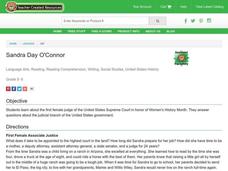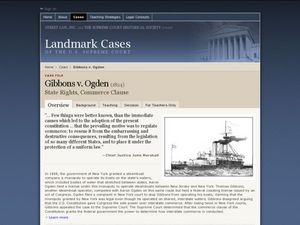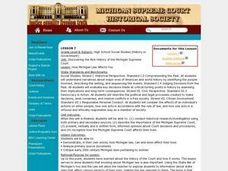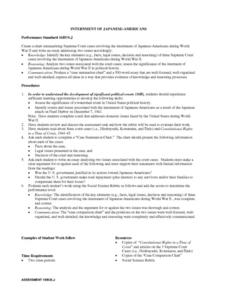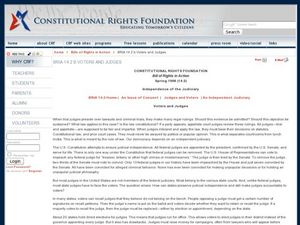State Bar of Texas
Tinker v. Des Moines
Freedom of speech allows anyone, even those in school, to say and do what they feel—right? The 1969 Supreme Court case Tinker v. Des Moines serves as the backdrop for a study on First Amendment rights. Scholars use a short video along...
Curated OER
Supreme Court Newspaper
Students examine the purpose and responsibilities of the Supreme Court and its justices. In groups, they research a specific case and identify how the Supreme Court affects their lives. Using the information they find, they create a...
Heritage Foundation
The Amendment Process and the Bill of Rights
Did you know that lawmakers have proposed more than 5,000 bills to amend the US Constitution in Congress? Your class learns intriguing facts about the process of choosing amendments. A variety of activities including before and after...
Curated OER
Sandra Day O'Connor
No unit on important women in history would be complete without a lesson on Sandra Day O'Connor. After reading background information about the first female Supreme Court justice, middle schoolers engage in several activities addressing...
Curated OER
Gibbons v. Ogden (1824)
High schoolers examine state rights and the commerce clause. In this Supreme Court lesson plan, students examine primary documents from Gibbons v. Ogden and discuss the implications of the decision.
Curated OER
Religion and Politics: The Battle Over the Judiciary
Learners analyze the relationship between religion an politics. For this Supreme Court lesson, students examine the results of the 2004 presidential election and explore how the results impacted George W. Bush and his Supreme Court...
Heritage Foundation
Procedural Amendments: Amendments III, IV, and V
So many US Constitution clauses, so little time. The 17th installment in a 20-part series teaches pupils about the Third, Fourth, and Fifth Amendments. Learning through activities such as group work, connecting to current events, and...
Administrative Office of the US Courts
US v. Alvarez
Is it illegal to lie about military service? Discuss the ways the First Amendment affects the Stolen Valor Act with a lesson that focuses on the Supreme Court case U.S. v. Alvarez. As high schoolers learn more about the history of the...
State Bar of Texas
Dred Scott v. Sandford
Who decides someone is not a real person? Scholars investigate the Dred Scott v. Sandford court case which deals directly with slavery and citizenship. After viewing a short video clip, classmates work in pairs to assess and discuss the...
State Bar of Texas
Baker v. Carr
Can the federal government override the state government to protect the citizens of the United States? The 1962 Supreme Court case Baker v. Carr outlines the issue of equal protection under the law. Scholars investigate with a short...
Curated OER
US Government: Supreme Court
Learners explore the powers of the Supreme Court. In this Judicial Branch lesson, students define vocabulary regarding the branch's responsibilities, take notes on a video regarding the branch, and discuss the powers of the branch in a...
State Bar of Texas
Gibbons v. Ogden
Have you ever played the game Monopoly? Do you know what it takes to win the game correctly? Scholars research the nature of outlawing monopolies in the United States while controlling trade. They investigate the court case Gibbons v....
Curated OER
People's Rights Change With the Decisions of the Courts
Ninth graders research the Bill of Rights, and the difference between a conservative and a liberal court decision. They examine how peoples' rights are expanded or limited by court decisions.
DocsTeach
U.S. v. Amistad: A Case of Jurisdiction
Just what is jurisdiction and why does it matter? A helpful activity takes academics on a journey to understand how judicial jurisdiction works. Scholars read excerpts from the Constitution and court documents to understand the process...
Project Tahoe
Individual Rights vs. The Greater Good Within the Scope of War
When, if ever, is the government justified in restricting individual rights? When, if ever, should the "greater good" trump individual rights? To prepare to discuss this hot-button topic, class members examine primary source documents,...
Curated OER
The Formation and Function of the Supreme Court
Students analyze the role of the U.S. Supreme Court. They read a handout and Article III, section 1 of the Constitution, analyze and rate by relevance noteworthy Supreme Court cases, and write how they decided each rating.
Curated OER
Michigan Court System (Part 1) (Middle School)
Students identify the courts that make up the Michigan judicial system. They explore the responsibility of each court and diagram how cases move to the Supreme Court. They compare and contrast the different types of courts.
Curated OER
Civil Rights and the Michigan Supreme Court I: A Case of Racial Discrimination in the late 1800s and Minority Supreme Court Justices
Students read the decision of the Michigan Supreme Court in the Ferguson v. Gies, a case dealing with discrimination in a restaurant. They participate in a class discussion about the case and the justices that presided over it. They...
Pacific University Oregon
Civil Rights: US History
To gain an understanding of the Civil Rights Movement of the 1960s, class members investigate the Jim Crow Laws, the Emancipation Proclamation, the 13th, 14th, and 15th Amendments of the US Constitution, and the 1898 Supreme Court case,...
Curated OER
Just how broken is the Senate?
Twelfth graders examine the role of the Senate in the United States. In this American Government activity, 12th graders read various articles and answer questions to these articles. Students write a letter to their Senator on...
Curated OER
Indiana Courts: How Do They Work?
Students identify the branches of Indiana's judicial system and determine the differences between the different courts and different types of cases. Students create a flow chart showing how a court case works its way through the legal...
Curated OER
How Michigan Law Affects You
Students examine how the laws in Michigan affect their lives. They use primary source documents to analyze the state's history. They discuss laws pertaining to women as well.
Curated OER
Internment of Japanese-Americans
Learners assess the significance of a watershed event in the political history of the United States . They identify events and issues associated with the internment of Japanese-Americans as a result of the Japanese attack on Pearl Harbor...
Curated OER
Voters and Judges
Students analyze the work on independent judiciaries. In this federal courts lesson, students listen to their instructor lecture on details of federal cases. Students respond to discussion questions and participate in an activity...





